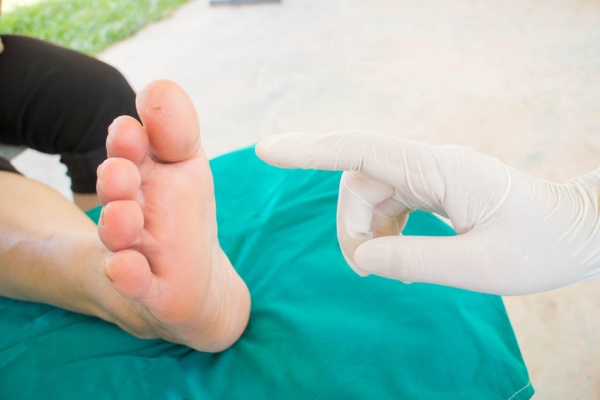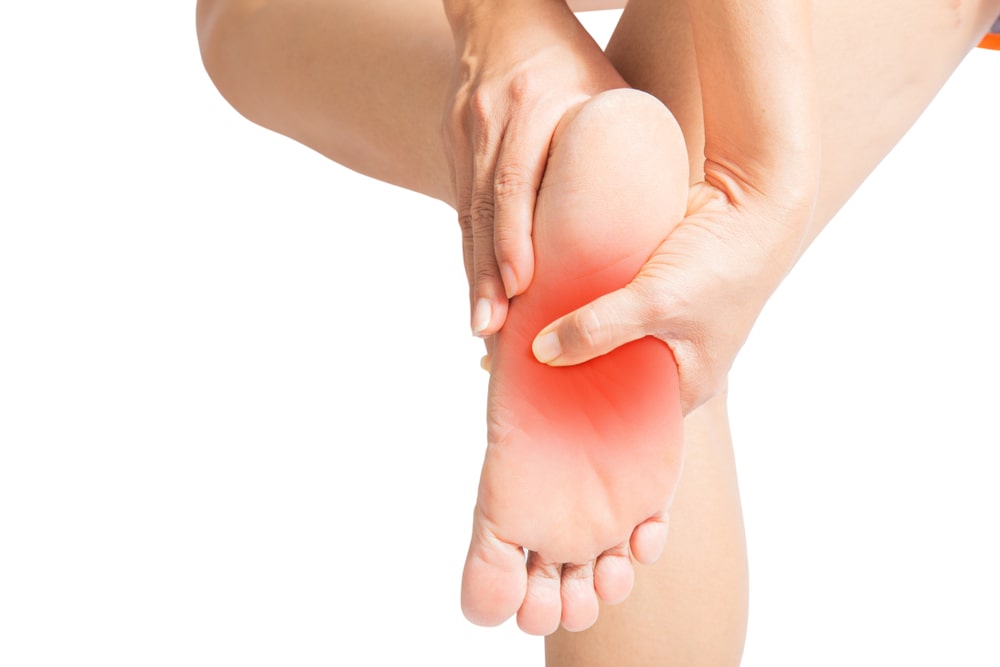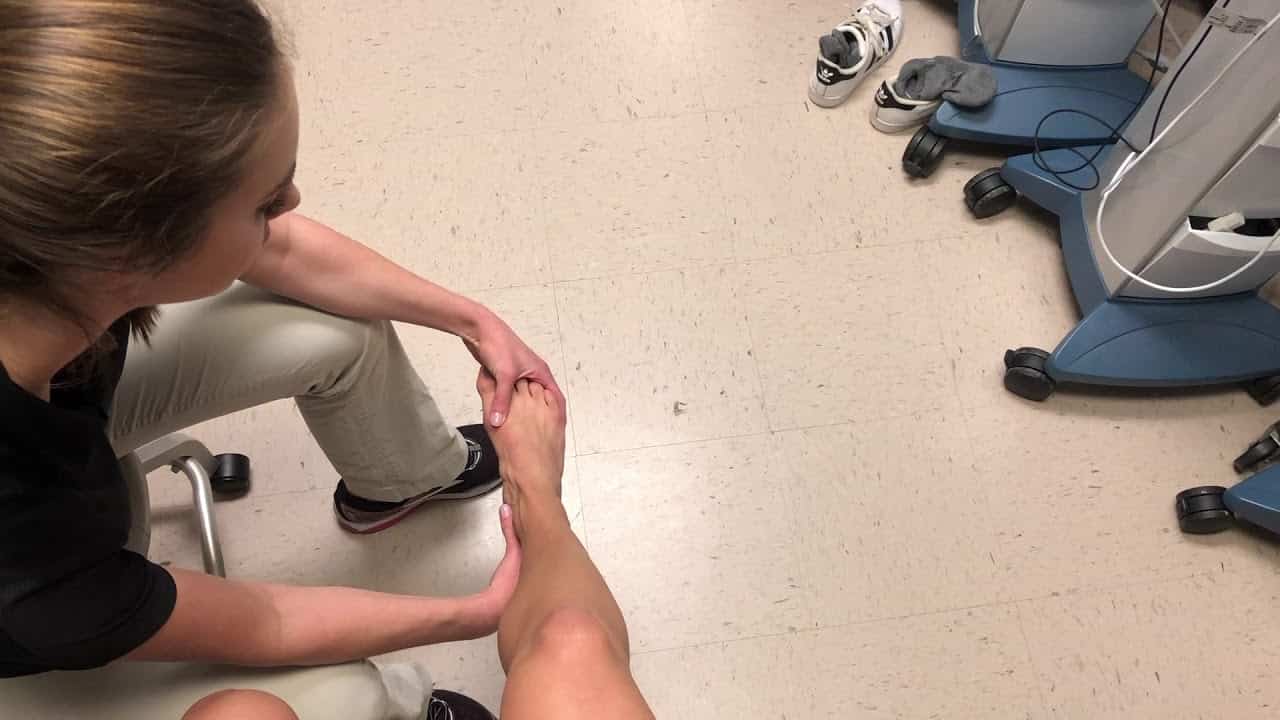DOES NEUROPATHY CAUSE FOOT PAIN?
Foot pain can occur due to various reasons including nerve pain. Pain in your foot can have a significant impact on daily life, and untreated nerve pain might prevent you from enjoying or accomplishing their regular activities.
Nerve pain results from a pinched nerve or a chronic condition including diabetes.
The interdigital nerves travel between the bones of the toes and supply till the bottom of the foot and toes. You commonly experience pain in the ball of the foot that results from long standing irritation of the nerves. This causes the nerves to enlarge as well as developing non cancerous (benign) growths of nerve tissue (neuromas) often occurring between any of the toes. Nerve pain is initiated by many factors, particularly non-supportive or poorly fitting shoes as well as thinning of the fat around the nerves, poor foot posture, or abnormal foot structure that stretches the nerves.

WHAT ARE THE SYMPTOMS OF NERVE PAIN AFFECTING FOOT?
People suffering with nerve pain in one or both feet may experience:
- A tingling, aching, or burning sensation
- Sensation of an electric shock in the foot or feet
- Pain worsening during the night or specific activities
- Muscle weakness or numbness in affected area
A neuroma might cause only a mild ache in the early stages around the third or fourth toe. It is occasionally accompanied by a burning or tingling sensation in the toes that worsen as the disorder progresses. A constant burning sensation radiates to the tip of the toes irrespective of the shoes you wear. Due to this you are unable to wear most closed-toe shoes.

WHAT CAUSES THE NEUROPATHY PAIN IN FOOT?
Neuropathy could be caused due to various reasons including: diabetes, trauma, chemotherapy, alcoholism and autoimmune diseases. Neuropathy is not caused by a single disease.
Some of the health issues that lead to nerve pain include:
1. Baxter’s Neuropathy – It is a form of nerve entrapment resulting from the compression of the inferior calcaneal nerve. These just sit under the base of the foot’s arch and are located on the inner part of the heel. If it becomes impinged it causes a sharp, burning pain, along with numbness and pins or needles like feeling around the heel. Baxter’s nerve entrapment might be caused after injuring your ankle or heel. But, more commonly it develops slowly without injury. It is not gender or age specific. The risk factors would include:
- Plantar fasciitis – It is the inflammation of the plantar fascia. It is the part of the feet that connects the heel bone to the toes.
- Obesity
- Bone spurs
- Flat feet, or fallen arches
- Muscular Enlargement
- Foot Hyper-pronation
You might experience symptoms like:
- A sharp/burning pain around the inner heel.
- Feeling like pins and needles around the inner part or under the heel mainly when the nerve is knocked or tapped.
- Pain if you touch the inside of the heel.
- Pain worsen with walking and placing your foot on the floor,
- Pain even after a period of rest or getting out of bed in the morning
2. Morton’s neuroma – This involves thickened tissues which compress the nerves between the toes. You might experience pain on the bottom of the foot worsening while walking, mainly in tight high heels. The pain could fade during rest or after removing the shoes. The pain is usually described as burning, stabbing, or tingling, or like an electric shock. It might radiate to the back of the foot or leg, causing cramping. Sometimes you might also feel numbness between your toes.
It is triggered by various factors including:
- Wearing narrow shoes
- Wearing high heels
- Inflammation of the joints
- Thickening of foot ligaments
- Injury to the front of the feet caused from high-impact sports or jogging
- Lipomas, which is lumps beneath the skin containing an overgrowth of fat cells
3. Tarsal tunnel syndrome – Causes pain in the feet and legs due to compression of the posterior tibial nerve. Tibial nerve runs down the back of the lower leg, or the plantar nerves in the feet. The reason for it is not clearly known thus it usually goes undiagnosed. Though it more commonly occurs in females.
Symptoms of tarsal tunnel syndrome mostly include:
- Sharp, shooting pain in the inner part of ankle radiating along the foot
- Numbness on the underside of the foot
- Pain while flexing and moving the foot
- Tingling or burning like sensation
- The symptoms might worsen at night especially while walking or standing and after physical activity. The pain often reduces after resting.
Tarsal tunnel syndrome might result from:
- Wearing poorly fitted shoes
- Injuring the feet or legs
- Post Surgical scarring
- Varicose veins
- Ganglion cyst
- Lipomas

4. Peripheral neuropathy – It usually causes numbness, tingling, and burning sensations in the toes, feet, fingers or hands. The symptoms usually worsen at night. Peripheral neuropathy could cause non-specific symptoms making it difficult to move the feet and do basic activities. The conditions that increase the chances of developing peripheral neuropathy include:
- Infections
- Deficiency of a nutrient like B12
- Alcohol abuse
- Diabetes
- Hereditary conditions like Charcot-Marie-Tooth disease causing a loss of muscle tissue
- Guillain-Barré syndrome, a condition that causes rapid muscle weakness
Symptoms of peripheral neuropathy vary depending on the type of nerves which are damaged, such as motor, sensory, or autonomic.
- Motor nerves – This controls the movement of all muscles under conscious control including walking, grasping things, or talking.
- Sensory nerves– This helps in transmitting information such as the feeling of a light touch, temperature, or the pain from a cut.
- Autonomic nerves – These control organs to regulate involuntary activities such as breathing, digesting food, and heart and gland functions.
5. Diabetic neuropathy – It commonly affects 90% of the people suffering with diabetes. Nerve pain could be triggered in both type 1 and type 2 diabetes mainly in the toes and feet. The nerve pain initially affects the toes and surrounding areas slowly spreading to the rest of the feet further moving up the legs.
Symptoms usually include:
- Burning, tingling, sharp, or shooting pain in the toes or feet
- Sensation of an electric shock in the affected areas
- Pain that worsens at night, causing sleep disturbances
- Pain when touching the skin
There are changes in the blood vessels, the metabolism, the immune system, or the body’s sodium and calcium channels. Several factors would increase your chances of developing neuropathy:
- Advancing age
- Having diabetes for a longer period
- Consuming alcohol
- Using tobacco products
6. Sciatica – It most commonly occurs when something damages or compresses the sciatic nerve. It is the longest and widest nerve in the body extending from the lower back, through the buttocks, and down the legs, ending just beneath the knee.
Herniated, or bulging, disk in the spine is the most common cause of sciatica. This tends to affect the back, hips, and upper legs first and further radiating down the legs into the feet and toes. Symptoms include:
- Back pain usually on one side
- Pain or a burning sensation in the buttocks
- Leg weakness
- Pain in the leg and foot

OUTLOOK
Nerve pain in the foot results from a compressed nerve or diabetes. Various health problems tend to cause similar symptoms. Thus, early diagnosis is the key to avoiding the condition worsening. You should contact a podiatrist if the pain is worsening or home care techniques cannot ease it.
The doctor would work on developing an effective treatment plan. Surgery is rare and tends to have a high success rate.
If you or anyone you know is suffering from foot problems, our expert providers at Specialty Care Clinics will take care of your health and help you recover.
Call us on (469) 545-9983 to book an appointment with our specialists.
